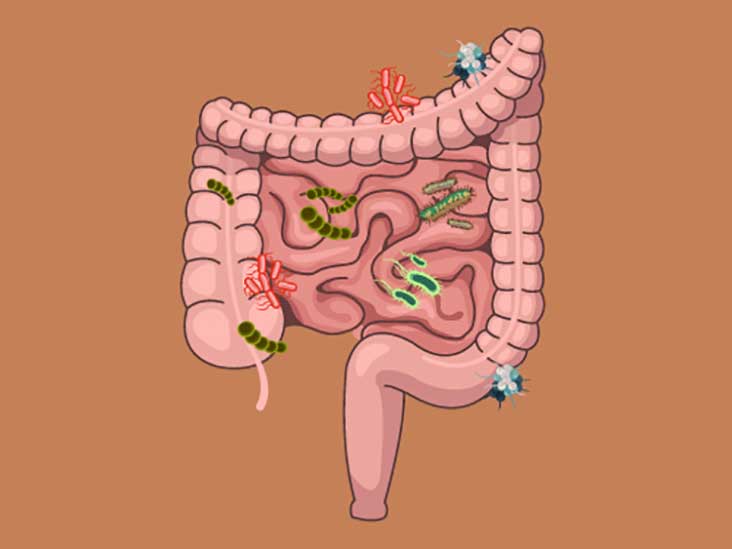To better grasp the part that gut microbes play in health and disease researchers from around the globe are investigating what makes a good gut microbiome. Microbiome is a term that describes the genome of all the microorganisms symbiotic and pathogenic living in and on all vertebrates.
 Why The Gut Microbiome Is Crucial For Your Health
Why The Gut Microbiome Is Crucial For Your Health
The microbiome defined as the collective genetic information contained within the microbiota including bacteria viruses and fungi residing in and on the human body has captured the attention of scientists from diverse disciplines and the imagination of an increasingly interested lay public.

Gut microbiome definition. A community of microorganisms such as bacteria fungi and viruses that inhabit a particular environment and especially the collection of microorganisms living in or on the human body The intestinal microbiome consists of the microorganisms that inhabit the gut. The microbiota contains bacteria but also fungi viruses and protists. The gut microbiome plays an important role in the metabolism breakdown of fiber.
Clara Abraham et al. Multiple factors contribute to the establishment of. A human being hosts 1013 bacteria in his gastro-intestinal tract as much as human cells in his body.
Professor Kristin Verbeke KU Leuven Belgium Editorial Board Gut Microbiome is an open access journal co-published by Cambridge University Press and The Nutrition Society with the aim of supporting the development of an integrated interdisciplinary understanding of the gut microbiome. The gut microbiota is the set of microorganisms that colonize our digestive tract. The gastrointestinal metagenome is the aggregate of all the genomes of gut microbiota.
The gut microbiota is with humans from birth and affects function throughout the body. Ana M Valdes and colleagues discuss strategies for modulating the gut microbiota through diet and probiotics Microbiome refers to the collective genomes of the micro-organisms in a particular environment and microbiota is the community of micro-organisms themselves box 1. Use of microbiome-based biomarkers in diagnosis prognosis risk profiling and precision therapy requires definition of a healthy microbiome in different populations.
Escherichia coli one of the many species of bacteria present in the human gut Gut microbiota gut flora or microbiome are the microorganisms including bacteria archaea and fungi that live in the digestive tracts of humans and other animals including insects. High-fiber foods include wholegrain cereals beans pulses nuts seeds and fruits and vegetables. Medical Definition of microbiome 1.
The human gastrointestinal GI tract harbours a complex and dynamic population of microorganisms the gut microbiota which exert a marked influence on the host during homeostasis and disease. As phages viruses plasmids prions viroids and free DNA are usually not considered as living microorganisms 55 they do not belong to the microbiota. The human microbiota consists.
The gut microbiome refers to all of the microbes in your intestines which act as another organ thats crucial for your health. This includes bacteria fungi viruses protozoa and archaea and the diversity of the microbiota will vary from person to person. The gut microbiome consists of the collective genome of microbes inhabiting the gut including bacteria archaea viruses and fungi.
The gut microbiome is an ecosystem of commensal symbiotic and pathogenic microorganisms that outnumber their hosts genes by more than 100 times. The gut microbiome which is usually defined as the total genome of microbiota that resides in the gut can be studied at compositional and functional levels using amplicon-based sequencing methods and omics approaches respectively Table 1. 45 The gut microbiome and its relationship with health and disease have been subject to extensive research and the gut microbiome has been shown to be involved in maintaining human metabolism nutrition physiology immune.
To determine features of the intestinal microbiota associated with health however we need improved microbiome profiling technologies with strain-level resolution. The gut microbiota definition refers to the microorganisms found in a specific environment by type. What is the human microbiome.
The journal focus on the contributing factors that influence the gut microbiota and in. Fiber or roughage describes the indigestible parts of plant foods. The gut microbiome plays an important role in digestion and nutrition The evidence is mounting for the inextricable link between a hosts microbiota digestion and metabolism.
Microbiota is usually defined as the assemblage of living microorganisms present in a defined environment 25.
